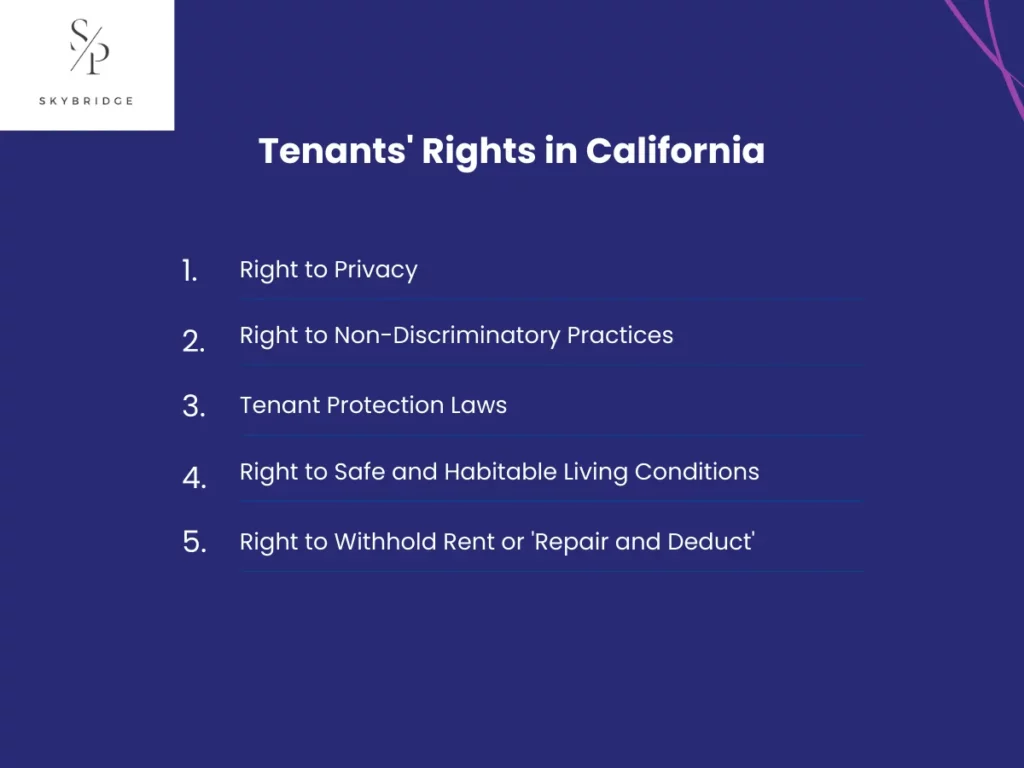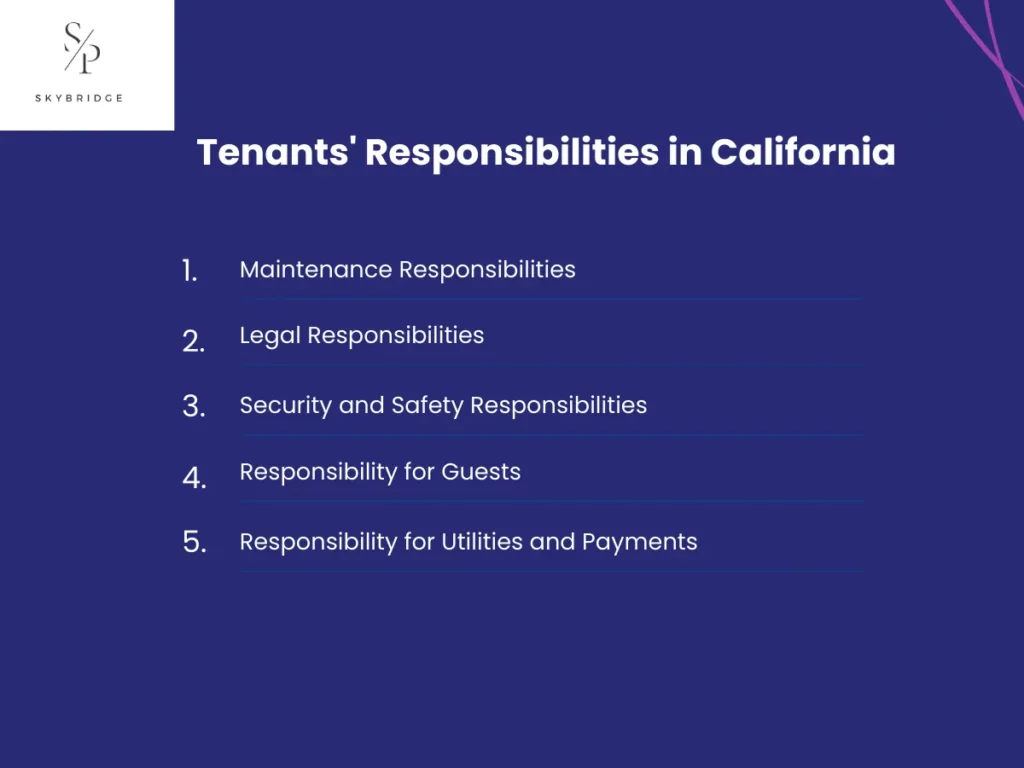Renting a home is more than just signing a lease; it’s about understanding the rights and responsibilities that come with it. In California, these rights and responsibilities are the core of a fair relationship between landlords and tenants. Being one of the first to enact statewide rent control laws under the California Tenant Protection Act (AB 1482), California presents itself as a tenant-friendly state. Over the years, the state has continued to prioritize tenant protections with laws like the Fair Employment and Housing Act and the Implied Warranty of Habitability.
For tenants, knowing your rights means a smooth, safe, and secure rental experience. Tenant rights, including habitable living space, protection against discrimination, and privacy, ensure that they are treated fairly and enjoy comfortable living conditions.
But tenant rights go hand in hand with responsibilities. Tenants must also fulfill obligations such as paying rent on time, maintaining the property, and following the lease terms. Understanding both rights and responsibilities is essential for a smooth rental experience and a positive relationship with your landlord.
What is a Tenant?
A tenant is a person who rents or leases a property from a landlord. This individual holds the right to occupy the rental unit based on the terms set out in a rental agreement or lease.
In the context of California, there are currently 16.9 million Californians who are tenants, making it the second-highest state in terms of tenants, following New York. This large number underscores the importance of understanding tenant rights and responsibilities under California’s rental laws, as they impact millions daily.
The rental agreement is the primary document that defines the tenant’s role. It dictates essential details like rent payment, property upkeep, and conduct within the rental space. Understanding this agreement is crucial for both tenants and landlords to maintain a fair and balanced rental relationship.
Tenants’ Rights in California
In California, renters are protected under strict laws designed to ensure safe, fair, and habitable living conditions. The California Civil Code and California Health and Safety Code are the primary laws governing tenant rights, offering strong protections against unfair practices, ensuring the right to privacy, and mandating that rental properties are kept in a habitable state.

Right to Privacy
Tenants have a strong right to privacy, as mentioned under California Civil Code §§ 1950.5, 1954 (2024), landlords are required to provide reasonable notice of 24 to 48 hours before entering a rental property. This law supports tenants’ right to privacy and protects them from any unwanted interference or invasion of their personal space.
Some of the extra key points of this right include:
- Protection against unauthorized landlord entry.
- Right to quiet enjoyment of the property.
- Right to confidentiality of the tenant’s personal information.
- Right to refuse entry for repairs or inspections without proper notice.
Right to Non-Discriminatory Practices
Under both the federal Fair Housing Act and the California Fair Employment and Housing Act (FEHA), tenants are protected against discrimination. These laws ensure that renters are treated equally and fairly, without being subjected to any form of bias.
Key protections falling within these practices include:
- Protection from discrimination based on race, religion, national origin, sex, or disability.
- Right to equal treatment in rental applications, lease terms, and conditions.
- Protection against retaliation for exercising rights, such as filing complaints or reporting discrimination.
If any of these rights are violated, tenants can file an official complaint with the California Department of Fair Employment and Housing (DFEH) or the U.S. Department of Housing and Urban Development (HUD).
Tenant Protection Laws
The California Tenant Protection Act (AB 1482) is specifically designed to provide renters with protections against unfair eviction practices and rent increases. This law ensures tenants have stability and security in their homes.
Key protections under the California Tenant Protection Act (AB 1482) include:
- Right to a written notice for any rent increases, providing tenants with clear and transparent communication.
- Security deposit protections, including a timeline of “21 days” for the return of deposits and an itemized statement detailing any deductions
- Right to dispute unlawful evictions or unfair treatment by landlords.
- Notification requirements for rent increases, with a 30-day notice for increases of 10% or less, and a 60-day notice for increases greater than 10%.
Right to Safe and Habitable Living Conditions
According to the California Civil Code § 1941.1, landlords are completely responsible for providing tenants a habitable living environment. The implied warranty of habitability requires landlords to maintain the property in a condition that does not endanger tenants’ health or well-being.
Some factors falling under the California Civil Code § 1941.1 law are:
- Right to live in a property that complies with health and safety standards.
- Protection against conditions that endanger tenants’ health, such as mold or pest infestations.
- Right to every available essential service like heating, water, and electricity.
Right to Withhold Rent or ‘Repair and Deduct’
When a landlord fails to make essential repairs that affect the habitability of a rental unit, tenants in California have the right to go against them. According to Cal. Civ. Pro. Code § 1174.2 and § 1942 (2024), tenants can withhold rent, move out without notice, or sue the landlord. Additionally, tenants have the right to use the “repair and deduct” remedy.
This means that tenants are eligible to:
- Withhold rent until essential repairs, such as fixing a broken heater, are completed.
- Move out without notice under certain conditions if the property becomes uninhabitable.
- Sue the landlord for failure to maintain the property.
- Contact health inspectors if the property’s condition poses a health or safety risk.
- Repair the issue themselves and deduct the cost from the rent.
Tenants’ Responsibilities in California
Along with the rights, tenants must fulfill certain responsibilities for a smooth and lawful living environment. These responsibilities include property maintenance, legal obligations, security, guest management, and timely payments. By meeting these obligations, tenants help maintain the property’s condition and ensure they are complying with the terms of their lease agreement.

Maintenance Responsibilities
As outlined in California Civil Code § 1941.2, maintaining the rental unit in good condition is a tenant’s responsibility. This includes keeping the space clean, preventing damage, and ensuring that the property remains safe and habitable.
Some factors falling under this law are:
- Keeping the rental unit clean and in good condition.
- Report damages or hazardous conditions to the landlord promptly.
- Performing minor repairs, such as unclogging drains or replacing lightbulbs.
- Maintaining the property to avoid causing damage, including ensuring appliances are used correctly.
Legal Responsibilities
Tenants must comply with the terms of their rental agreement and state laws to maintain a lawful tenancy. These obligations promote a peaceful, lawful living environment.
As a tenant, here are some major legal responsibilities you must follow:
- Paying rent on time as outlined in the terms of the agreement.
- Following the lease terms, including restrictions on subletting, pets, and noise levels.
- Avoiding illegal activities on the premises, such as drug use or criminal behavior.
Failure to meet these responsibilities can result in eviction under California Civil Code § 1946 or other legal consequences.
Security and Safety Responsibilities
An additional responsibility that falls under the tenant’s responsibility is the assurance of security and safety for themselves, their neighbors, and the landlord. This includes actions like securing doors and windows and reporting safety hazards.
Extra factors falling within this responsibility are:
- Notifying the landlord of security issues, such as broken locks or malfunctioning alarms.
- Report safety concerns, like unsafe stairs or exposed electrical wires, to the landlord immediately.
- Ensure the rental unit is secured by locking doors and windows.
Responsibility for Guests
While tenants are responsible for their actions within the property, they are also accountable for the behavior of their guests while on the rental premises. This includes ensuring that guests must also be aware and adhere to the terms of the agreement with the landlords and do not cause disturbances or damage
Major responsibilities for guests include:
- Ensuring guests follow the terms of the lease agreement.
- Not allowing guests to stay for extended periods without prior approval from the landlord.
- Ensuring that guests do not cause damage to the property or disrupt other tenants.
Responsibility for Utilities and Payments
Along with the responsibility of maintaining the rental property, tenants are typically responsible for covering utility expenses unless explicitly stated otherwise in the lease agreement. This responsibility includes ensuring the continuous and proper management of essential services.
Some of them are:
- Paying for utilities as specified in the lease agreement (e.g., gas, water, electricity).
- Complying with any utility-sharing arrangements or payment splits in multi-unit properties.
- Keeping utility accounts in good standing to avoid disruptions.
- Reporting utility issues or outages to the landlord or service provider on time.
Get a Better Rental Experience with a Clear Understanding
A great rental experience in California starts with knowing and following the state’s rental laws, which outline the rights and responsibilities of both landlords and tenants. While this legal clarity is vital, navigating the details can be complex, making the involvement of a local California property management company especially valuable. These professionals bring local expertise, ensure compliance with regulations, handle maintenance promptly, protect tenant rights, and maintain open, consistent communication. By combining legal expertise with hands-on management, a property management company fosters a smoother and more transparent rental process that benefits both landlords and tenants.







